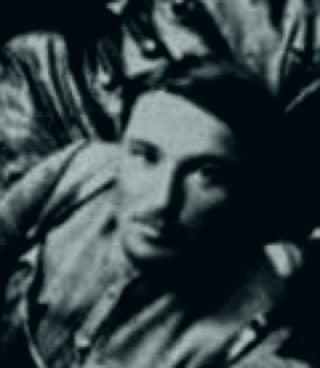
Viktor Fedorovych Bilash was the Chief of Staff of the Revolutionary Insurgent Army of Ukraine (RIAU) under Nestor Makhno. A gifted military commander, Bilash himself planned many of the Insurgent Army's operations, later becoming its commander in chief after Makhno's flight into exile.

Semen Mykytovych Karetnyk was a Ukrainian anarchist and a commander of the Revolutionary Insurgent Army of Ukraine (RIAU). He often replaced Nestor Makhno as supreme commander of the Insurgent Army in 1920. Karetnyk gained a reputation for his central role in defeating the White Army in Crimea in November 1920.
The Nabat Confederation of Anarchist Organizations, better known simply as the Nabat, was a Ukrainian anarchist organization that came to prominence during the Ukrainian War of Independence. The organization, based in Kharkiv, had branches in all of Ukraine's major cities. Its constitution was designed to be appealing to each of the different anarchist schools of thought.

The Revolutionary Insurgent Army of Ukraine, also known as Makhnovtsi, named after their leader Nestor Makhno, was an anarchist army formed largely of Ukrainian peasants and workers during the Russian Civil War of 1917–1922. They protected the operation of "free soviets" and libertarian communes by the Makhnovshchina, an attempt to form a stateless anarcho-communist society from 1918 to 1921 during the Ukrainian War of Independence.

Panteleimon "Panteley" Fyodorovich Belochub, , was a Ukrainian soldier best known as one of the commanders of the Revolutionary Insurgent Army of Ukraine, a major belligerent force during the Russian Civil Wars of 1917 – 1921.

The 1st Donetsk Corps was a military formation of the Revolutionary Insurgent Army of Ukraine, it was created on 1 September 1919 and existed until 1920.
The 2nd Azov Corps was a military formation of the Revolutionary Insurgent Army of Ukraine, one of the 4 corps that was created on 1 September 1919, and existed until 1920.

The Air Fleet of the Revolutionary Insurgent Army of Ukraine was one of the branches of the Revolutionary Insurgent Armed Forces.
Oleksandr Kalashnykov was a Ukrainian anarchist and a commander of the 1st Donetsk Corps of the Revolutionary Insurgent Army of Ukraine.
Mikhail Uralov was a Russian anarchist, the head of the "Black Guard" combat units of the Moscow Federation of Anarchists ,and a commander of the Revolutionary Insurgent Army of Ukraine.
Hryhorii Ivanovych Makhno was a Ukrainian rebel commander and brother of Nestor Makhno.
Oleksiy Vasylovych Chubenko was a diplomat for the Revolutionary Insurgent Army of Ukraine.
Vasyl Mikhailovych Sharovsky was a member of the Central Council of Ukraine, an anarcho-communist and an artillery commander of the Revolutionary Insurgent Army of Ukraine.

The flags of the Makhnovshchina consisted of a number of different black and red flags, each emblazoned with anarchist and socialist slogans.

Foma Kozhyn was a Ukrainian revolutionary and the commander of the machine-gun regiment of the Revolutionary Insurgent Army of Ukraine.

Vasyl Kurylenko was a commander in the Revolutionary Insurgent Army of Ukraine.
The Kontrrazvedka was the counterintelligence division of the Revolutionary Insurgent Army of Ukraine. Its main functions were to carry out military reconnaissance, the prosecution of captured enemies and counter-insurgency operations.
Mykhailo Brova was a Ukrainian anarchist military commander and member of the Makhnovist movement. He was a delegate to the Regional Congresses and member of each convocation of the Military Revolutionary Council.
Luka Nykyforovych Bondarets was the cavalry commander of the Revolutionary Insurgent Army of Ukraine (RIAU).
Yakiv Sukhovolski, also known by his nom de guerreYakiv Alyi (1880–1920) was a Ukrainian anarcho-syndicalist and writer. He was a member of the secretariat of the Nabat.








